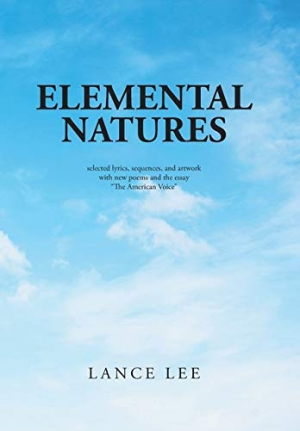Elemental Natures
Selected Lyrics, Sequences, and Artwork with New Poems and the Essay "The American Voice"
Inviting meditation, the poems of Elemental Natures are disturbing and enlightening as they address contemporary American cacophonies.
Lance Lee’s retrospective collection of poems, art, and an essay, Elemental Natures, addresses volatile situations with clarity.
Beginning by arguing that there’s an increasing need for a “lyrical I,” or a signature American voice that is audible beyond general violence and media saturation, this book concentrates on issuing a beautiful sound without dwelling on social ills. Most of its poems are called lyrics, and many aim to affect rich, layered tones.
Some entries focus on how nature’s wildness is reflected in human souls, their foci visceral: “We are the blood pumped through the great heart of things,” one declares. These help to develop the book’s singular voice—one that is close both to the environment and to other beings, asserting that “we are all in nature, a city no less than a beaver’s dam or an anthill but built the way each of us can.”
The book first introduces major personal themes, focusing on relationships with grandparents, parents, a wife, a daughter, and heroes of literature and history. It covers homes on both coasts and the animals and nature around them. The sections that follow the book’s opening expand on such themes, projecting their contemporary milieus onto historical contexts. Among these is a take on The Odyssey, which is paired with stark-lined, jagged-edged pen and ink drawings of ancient Greek pottery that are decorated with modern images. The combination is attentive to the feelings behind the words. The book’s most recent poems distill its ultimate message into pithy, tender entries that are as direct as its drawings.
The book concludes with an essay, “The American Voice,” that suggests criteria by which to judge the book as a whole. It argues that Walt Whitman, Robinson Jeffers, and Robert Lowell are the best examples of the American voice because they departed from academic models of poetry to write in rapture. A question about who is the current American voice arises, suggesting, but not pronouncing, Lee as an answer.
In their organizations and forms, the poems are sensual and pleasing. They are bound by conceits that connect one to the next; these include birds, people, and seasons. The longest poems appear in the book’s middle; the book tapers off, and its most condensed poems come at its end. The arc is satisfying.
Lee’s punctuation and indentation choices play a role in shaping the poems’ visual meanings. Many reserve their periods for their ends; some are without end punctuation at all. Images and phrases string together to form jaunty, lasting impressions, while italicized lines result in a sense of depth and breadth, like distant dialogues with unseen others. Images of desertion, neglect, fighting, and predators eating prey combine with tender scenes between lovers to form a complete picture that is both dark and light.
Inviting meditation, the poems of Elemental Natures are disturbing and enlightening as they address contemporary American cacophonies.
Reviewed by
Mari Carlson
Disclosure: This article is not an endorsement, but a review. The publisher of this book provided free copies of the book and paid a small fee to have their book reviewed by a professional reviewer. Foreword Reviews and Clarion Reviews make no guarantee that the publisher will receive a positive review. Foreword Magazine, Inc. is disclosing this in accordance with the Federal Trade Commission’s 16 CFR, Part 255.

